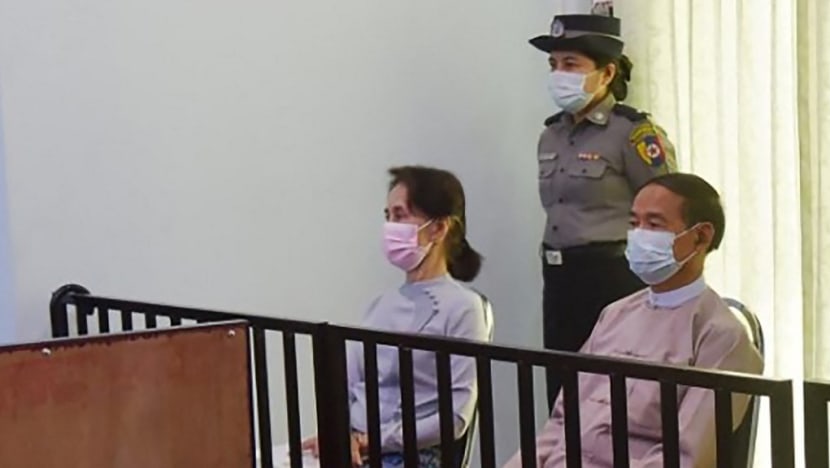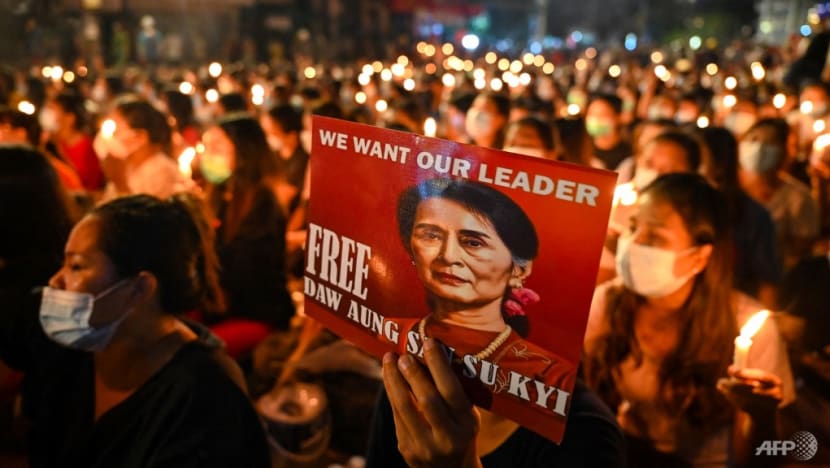Commentary: Aung San Suu Kyi's charges show she has been an obstacle to Myanmar military’s interests
The State Administration Council's attempts to render Aung San Suu Kyi politically irrelevant might well have an obverse effect says ISEAS-Yusof Ishak Institute's Moe Thuzar.

SINGAPORE: "All absurd", said Daw Aung San Suu Kyi when accused of corruption in October.
“Absurd” best describes the whole process of charges brought against her since February up to the recent verdict on Monday (Dec 6).
Within hours of this verdict, Aung San Suu Kyi’s four-year prison sentence for incitement and violating pandemic safety restrictions was commuted to a two-year house arrest. Still, it gives a foretaste of sentences yet to be meted out.
The State Administration Council (SAC) junta has slapped a total of 12 charges against her, with a potential combined prison term of more than 100 years.
This array of charges demonstrates the single-minded focus with which the SAC has attempted to discredit and delegitimise Aung San Suu Kyi’s political and popular standing.
The nature and process of the charges brought against Aung San Suu Kyi highlight the military’s entrenched view that she and the National League for Democracy (NLD) are obstacles to the military’s political and economic interests, and that the Feb 1 coup is above all, an anti-NLD project.
CHARGES AFTER CHARGES
Days after the coup, the SAC-controlled legal system first charged her with "illegally" importing walkie-talkies, and violating the COVID-19 pandemic guidelines under the Natural Disaster Management law.
Two further charges called her out for incitement and possession of unlicensed communications equipment.
Among others, the junta used testimonies from former Yangon Chief Minister and Suu Kyi stalwart Phyo Min Thein and businessman Maung Weik, who is known to be close to military circles, to pile on at least four corruption charges.
These include receiving bribes of cash and gold, and land lease and construction irregularities for a charitable foundation established in Aung San Suu Kyi’s mother’s name. She has also been implicated in an additional corruption charge involving the rental of a helicopter.
The most serious charge to date is that of violating the Official Secrets Act, together with three of her ministers and economic advisor, Australian academic Sean Turnell.
A civilian filed an additional charge against her for violating COVID-19 restrictions. The SAC-appointed election commission has also accused Aung San Suu Kyi, senior NLD members, and the NLD-appointed election commission chair, of electoral fraud.

THE TRIAL
Aung San Suu Kyi’s trial — in a closed court — started in June, but hearings were suspended in July when a COVID-19 third wave swept through Myanmar. They resumed in September.
The Dec 6 verdict took place in the midst of an outcry over security forces mowing down unarmed protesters on Dec 5, killing at least five, in Yangon.
That same day, junta chief Senior General Min Aung Hlaing visited NLD patron U Tin Oo in an attempt to show the military’s cordial relations with the NLD. Tin Oo, a former commander-in-chief, was one of the NLD’s founders, and is now in frail health.
Min Aung Hlaing also visited another ailing former general, Khin Nyunt, who was military intelligence chief and, for a short while, prime minister in the State Peace and Development Council military regime until 2004.
These visits — under the guise of paying respect to ailing seniors — come at a time when the military is stretched thin in responding to clashes from local resistance forces in the Sagaing and Chin areas. This suggests an element of desperation, belying the SAC’s assertions of "effective control".
The SAC’s attempt to show "magnanimity" in reducing the prison sentences of Aung San Suu Kyi and Win Myint does not fool anyone.
Since the 1962 coup, military authorities have suborned the country’s judiciary system to crush opponents and activists.
The short decade of opening, over 2010 to 2020, could not undo this decay. With the judiciary now under the SAC’s thumb, people in Myanmar and the international community can expect the SAC to continue with their "rule by law" (as opposed to "rule of law").
But the military’s efforts to diminish the stature and influence of Aung San Suu Kyi have yet again backfired. The SAC’s attempts — which mirror those of previous military regimes — to render her politically irrelevant, have had the opposite effect.
Even with her political career seemingly at an end, Aung San Suu Kyi provides a rallying point for many coup protestors, and a point of focus for regional and international interlocutors.
INTERNATIONAL RESPONSE
The international community is not buying any of the trumped-up charges. The United Nations, European Union and the United States have termed the verdict a "sham trial", "politically motivated" and "an affront to democracy", respectively.
ASEAN has not reacted to the verdict, but in October the grouping had made a historic move not to allow Min Aung Hlaing or a ministerial representative to the annual Summits. Outside Myanmar, the junta’s manoeuvring room is growing narrower.
Dealing with Aung San Suu Kyi continues to present a wicked problem for the junta. The SAC’s attempts to silence her with numerous and implausible legal charges have not silenced popular resistance to the coup.
Coup protestors and the parallel National Unity Government, which still keeps her as State Counsellor, have grown beyond her vision of democratic self-rule free from military dominance, and present a stronger, combined commitment to tackle Myanmar’s long-standing challenges.
In the end, restricting Aung San Suu Kyi — and access to her — will not help the SAC’s quest for legitimacy at home, and especially in the eyes of the international community.
Moe Thuzar is Fellow and Co-coordinator of the Myanmar Studies Programme at ISEAS – Yusof Ishak Institute. This commentary first appeared on the ISEAS - Yusof Ishak blog, Fulcrum.



















